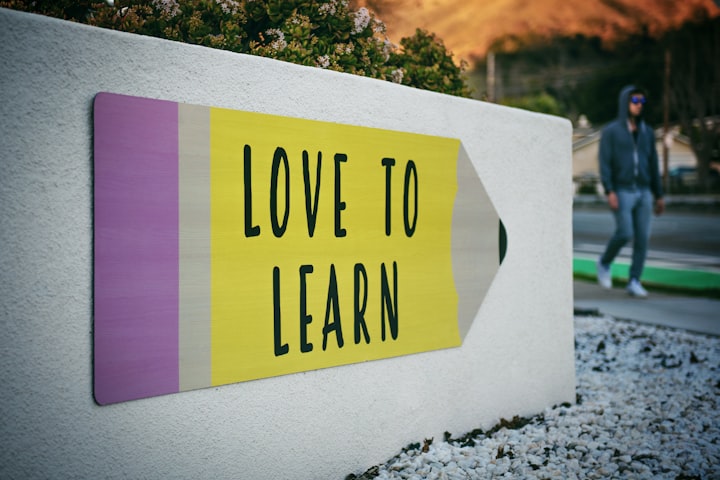Learn How To Learn
Steps to Maximising the Learning Experience

Learning is a basic life process that we practice every day with our different senses, and perhaps immersing in the educational experience to its fullest is a common aspiration for many. Learning is just like movement, breathing, and speech. And the mind is like a muscle that requires it to be warmed up continuously - and in the right way - to achieve the maximum possible benefit in a short time. Especially if you belong to the student category of learners, it is important for you to make as much time as you can during the learning and study sessions to be able to balance education with other aspects of your life.
To do this, there are many methods that you must follow in your daily attempt to learn, which not only enables you to speed up the learning process, but also helps you to master your scientific material whatever it is and to retrieve information better.
Improve your memory and increase your concentration:
Having a good memory improves your focus and increases the speed at which you retrieve information. Accordingly, to prepare before any study session, you must clear your mind and prepare it for memorisation, by choosing the appropriate environment for study, preparing your own drink that you prefer when studying, organising your goals for the day and then allocating the specified time for each scientific subject.
Psychologists also recommend some methods that strongly increase your focus and improve learning efficiency, among the most important of these strategies that help you improve memory:
- Exercising, which is linked to strengthening memory and mental health.
- Human communication, such as engaging in various social activities, has also proven its ability to improve memory.
- Get enough sleep.
- Remove distractions, such as the mobile phone, that may distract you, and put them away from the study area.
- Arrange the topics you are studying in bullet points to make it easier for you to recall them.
- Discuss with yourself what you are studying, explain the scientific terms you are studying at length to yourself out loud, this method helps you more to remember the information.
- Use visual aids as much as you can, such as pictures, graphics, and charts, to enhance your visual memory of the subject matter.
- Read the information you are studying out loud.
Learn in many different ways:
Memory has several approaches to preserving information. There is visual memory, including the brain when we read it, audio memory when listening and listening, oral memory when pronouncing information, sensory memory that consists of investigation and experience, and hand memory when writing. And diversifying between the entrances through which you receive information improves its preservation in our memory.
If you depend in your learning a language, for example, on listening to audio lessons, it is better for you to add to this other ways that enable you to study the information visually and orally, such as explaining what you are studying to one of your colleagues, taking notes in lectures, and mind maps to summarise the main headings and the most important information that have been ingested.
Learning in more than one way deepens your understanding of information, which increases its memorisation and stability in memory.
It has also been scientifically proven that writing notes in your handwriting on paper is better reflected on the memory than writing on the phone or the keyboard, because we have a manual memory that contributes to retrieving information.
Explain what you have learned to your peers:
Explaining the information to others is one of the best ways to understand and study it, as it constitutes a special memory that facilitates your recall of the information you are associated with.
Create your own style of study material after you understand it and then find a way to share it with your peers, such as creating your own blog, podcast, or joining online discussion groups.
Continuously add to your previous information:
Always connect the scattered points in your memory by connecting your previous information with what you just learned.
For example, when you learn a new language with different grammar and vocabulary, associate it with your native language or one of the other languages you are fluent with by using similar words between the two languages.
Consistently apply what you learn:
For many, attending lectures, reading scholarly references, listening to explanations of materials and searching in the library or on the Internet is the primary way to learn. Reading, reviewing and writing information while studying is undoubtedly important, but it alone cannot help in learning and mastering a skill.
Therefore, the practical application of skills and continuous training in what you study greatly improves your understanding of what you are learning. For example, if you are memorising one of the equations, it will help a lot if you apply the equation in practice in the lab and watch the results and change colours in remembering the correct chemical symbols in the exam when you retrieve them while distance.
Conversing with others and using your newly learned vocabulary in your speech helps greatly in acquiring a new language and refining the learning experience.
Remember the scientific material at intervals:
Instead of spending a long time studying and getting bored after a short time, divide your study session into several periods with a short break.
Start by reading and studying one of the paragraphs of the material, then take a short break and come back to read what you have memorised and add another paragraph to the previous one.
Scientists consider this method one of the most efficient and best ways to learn and study.
Increase the performance of exams and academic exercises:
Studies have proven that solving many questions and exercises helps you better remember the information, and this method is better compared to what some believe that spending more hours studying is the best way to memorise.
When you solve exam questions, your brain constantly recalls information from memory, which improves your long-term memory of the information, even if it is not among the questions you are solving, as it is a memory training process in itself.
When studying and studying, there are also some things that you should avoid in order to make your studying sessions more effective and fulfilling, among the most important of these are:
Stop doing more than one task at once!
While it is now common to promote the idea that it is necessary to acquire many skills quickly and make the most of time, and that whoever can do more than one activity at a time has the advantage over his peers, experience has proven every time that focusing on one thing for a period of time is the best way Guaranteed achievement and learning, and this also applies to your performance of daily activities while studying.
During the study, the sources that you study from do not exceed two and do not move between the subjects every period. Focus on one task or one scientific subject and set - in advance - a specific time to complete it; In this way, you can overcome the problem of "multitasking" and the distraction it causes and loss of your focus.
Don't be afraid to make mistakes:
We are all taught from a young age that we should avoid making mistakes, but recently research has revealed the positive side of making mistakes.
When you make a mistake in solving a question and correct the question later, this contributes to learning the scientific material, especially when your answer is close to the correct answer.
And when you make mistakes and follow the reasons that made you wrong in choosing the answer or reach the wrong conclusion, spending that time in research and reading the scientific material increases the strength of your memorisation of it, so you never worry about your mistakes while learning.
Never stop learning new things:
Practice improves all activities, especially study, and recent scientific studies have proven that although the brain is constantly able to manufacture new neurons (neurogenesis), many of these cells will gradually atrophy if you stop activating them by learning, just as is the case with the muscles in your body.
So never stop learning and discovering new skills and information constantly and do not focus your attention on one area of reading, but rather explore new and different things in many areas, and expand your horizons when it comes to learning and doing new activities.
In the end, building new habits requires great effort and determination to reach the desired results, especially with regard to learning, so you have to start using some of the methods we presented today while studying and choose from them that suit your abilities and style of reading. Most importantly, believe in your ability to learn and acquire new skills, and feel that above all, there is no use in something you cannot believe in.
About the Creator
Judith Isidore
I'm happy to share my stories with Vocal media community.






Comments
Judith Isidore is not accepting comments at the moment
Want to show your support? Send them a one-off tip.